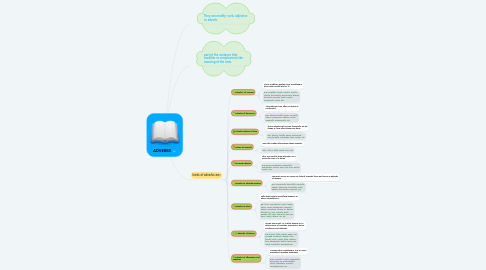
1. They can modify: verb, adjective or adverb.
2. part of the sentence that modifies or complements the meaning of the verb.
3. kinds of adverbs are:
3.1. adverbs of manner
3.1.1. These modifiers explain how something is done.most usually end in -ly
3.1.2. E.g: carefully, slowly, quickly, closely, clearly, fortunately, generously, glenty, honestly, joyously, lazily, noisily, nerveously, rarely, etc.
3.2. adverbs of frequency
3.2.1. They indicate how often an action is performed.
3.2.2. E.g: always,usually, never, normally, often, sometimes, seldom, rarely, generally, occasionally, etc.
3.3. adverbs relative of time
3.3.1. These adverbs tell us how frequently we do things or how often things are done
3.3.2. E.g: always, usually, never, tomorrwo, now, tonight, yesterday, then, today, etc.
3.4. advers of quantify
3.4.1. Give the reader information about quantity.
3.4.2. E.g: A lot, a little, much, very, etc.
3.5. focusing adverbs
3.5.1. They are used to draw attention to a particular part of a clause.
3.5.2. E.g: even, particularly, especially, specifically, merely, only, just, also, either, purely, too.
3.6. abverbs as attitude markers
3.6.1. Interpret events or onvey our beliefs towards them and serve as adverbs of manner.
3.6.2. E.g: Apparently, hopefully, naturally, clearly, obviously, hopefully, really, blindly, fortunately, naturaly, etc.
3.7. adverbs of place
3.7.1. Tells about where something happens or where something is.
3.7.2. Eg: here, everywhere, near, nearby, down, away, backwards, upwards, about, anywhere, above, in, below, behind, on, out, outside, back, nearby, off, over, towards, east, far, here, under, where, up, etc.
3.8. adverbs of degree
3.8.1. Shows how much, or in what degree or to what extent of qualities, properties, states, conditions and relations.
3.8.2. E.g:Almost, fully, rather, quite, too, enough, perfectly, deeply, fully, hardly, most, nearly, little, indeep, less, absoñutely, highly, least, just, much, perflectly, positively,etc.
3.9. adverbs of affirmation and negation
3.9.1. Answers that something is true or some equivalent negative statement.
3.9.2. E.g: Certainly, surely, apparently, obviously, no, undoubtedly, rarely, definitely, scarcely, contradictorily, etc.
